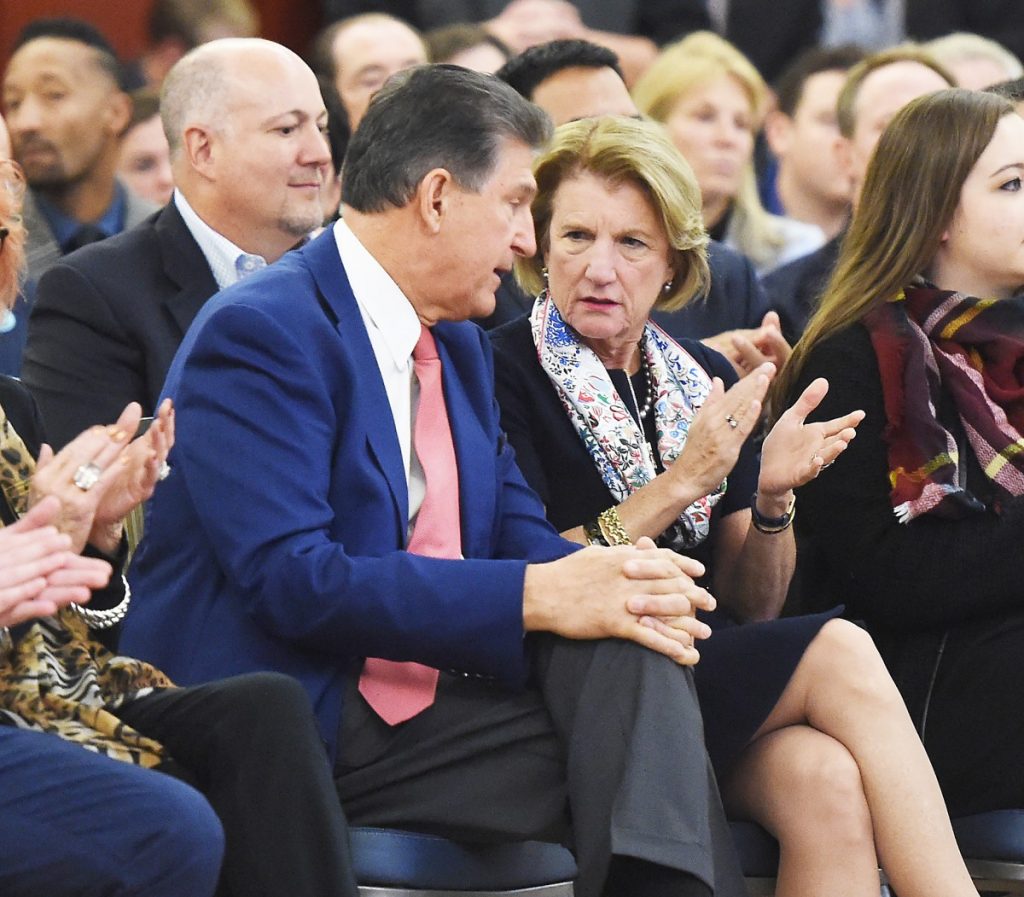MORGANTOWN — U.S. Senate Republicans and Democrats are at odds over and addendum package to the CARES Act proposed Thursday morning by Majority Leader Mitch McConnell.
West Virginia’s senators Joe Manchin, D, and Shelley Moore Capito, R, both expressed their views on the topic. Manchin held a press call and Capito spoke to The Dominion Post in a phone interview.
And while the two disagree over aspects of the proposal, they jointly issued a release calling on leadership to expand access to coronavirus relief for public hospitals.
First, the CARES addendum dubbed by some as CARES 3.5.
McConnell proposed another $250 billion to supplement CARES’ $350 billion for its Paycheck Protection Program, which offers loans for small businesses of 500 or fewer employees.
Capito explained that the PPP has had widespread interest since it went online on Friday. Nationwide, there have been 412,000 loan requests totaling $107 billion. It became obvious that the $350 billion wold go quickly, which led McConnell to propose the addendum without any policy changes.
“For the life of me I don’t see why there wold be objections to that,” she said. McConnell hoped to be able to move the bill by unanimous consent, but Democrats objected and blocked action.

Manchin said Democrats weren’t consulted and don’t believe McConnell’s package does enough.
They want half of McConnell’s portion to be set aside for rural businesses, fearing that larger small businesses closer to 500 employees will swallow up the money first. They also propose some streamlining for the application process.
They’re also proposing an additional $250 billion. From that, $100 billion would go to grants for hospitals, public and private entities and others to cover unreimbursed health-care expenses or lost revenues.
“I’ve got hospitals basically struggling to stay open right now,” Manchin said.
The remaining $150 million would go to states tribes and local governments to backfill lost revenues.
Manchin said McConnell is correct that the PPP needs another $250 billion, but the federal government is failing to give clear guidance on how to work through the process and get the money.
While Manchin says McConnell’s package doesn’t do enough, Capito says it’s too soon to propose new packages – the Senate will be back in session on April 20 and will evaluate how CARES is doing at that point.
Manchin believes that states and local governments need the money proposed in their package to fill budget holes caused by the economic shutdown.
Gov. Jim Justice said Wednesday that this state is facing a $350 million shortfall for this fiscal year, with about $300 million of that tied to deferred income tax collections. West Virginia is epecting $1.25 billion but doesn’t know how it can be used.
Capito said CARES already has $150 billion for the states, but it’s not clear what it can be used for. The bill says it’s for coronavirus-related expenses, but the Senate needs to clarify when it returns that states and local governments can use it for backfilling. There’s time, she said, because the money won’t go out until April 24.
Capito said she understands the need for hospital funding, but $30 billion of CARES hospital money was going out that very day and they need to see how it pans out before they allot more.
It was unclear Thursday afternoon, according to multiple sources, how long negotiations might go on and a bill might get passed.
Public hospital support
On the unified front, Manchin and Capito co-signed a letter, along with seven other senators, urging Senate leadership to clarify eligibility for publicly owned hospitals and similar care providers within the PPP.
Currently, they said, both for-profit and nonprofit hospitals are eligible for assistance, creating a disparity. Many hospitals are canceling routine procedures and appointments, resulting in revenue declines as high as 80 percent.
The letter says, “Our small rural hospitals regularly struggle with their razor-thin margins but are now facing difficult choices that range from significant staff furloughs to permanently closing the doors of their community’s lone hospital.
“Many of these hospitals are small, county-owned public hospitals who are currently denied access to funding included by Congress in the CARES Act. We ask that you clarify that publicly owned hospitals and similar care providers are eligible entities for the Paycheck Protection Program relief program administered by the Small Business Administration.”
They note in their joint release that over the past decade, 128 hospitals have closed and an additional 450 hospitals are at risk of closure. The COVID-19 pandemic puts public hospitals at an increased risk of closure.
The letter concludes, “As a Congress, we must prevent an unnecessary loss of providers and health workforce during this pandemic. This can be avoided by ensuring these needed entities are able to access the assistance Congress has already deemed necessary in the CARES Act.”
Tweet David Beard @dbeardtdp Email dbeard@dominionpost.com




